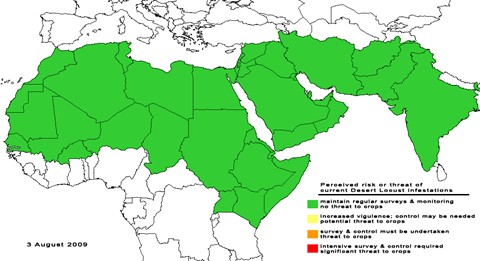
The fact the map above is entirely green-and-white attests to the success of one of modern history’s great international projects: the FAO‘s Locust Watch. When the project started in 1979, the ravenous critters were a regular menace from Mali to eastern India, in large part because of a lack of information flow—countries were seldom aware of nascent plagues in their neighbors. So the FAO developed a hierarchical system, equipping local officials throughout Saharan Africa and Asia with the tools necessary to note conditions in which locusts might thrive, and whether there were hoppers about. (Case in point: This recent Mauritanian alarm.) Local surveyors were then asked to send their field notes to national authorities, who in turn collated the data and passed it along to FAO. When done with appropriate alacrity, pesticides could be applied to problem areas, before the locusts could mass and move eastward.
There have been subsequent improvements in modeling and surveying technology—the development of remote sensors capable of detecting hopper activity in remote areas, for example, or satellite imagery that can discern when certain areas of vegetation are ripe for infestation. But the core of the project remains the open communication between locals, national, and international authorities. That’s no mean feat—our species is naturally reticent to share data, paranoid as we are that such information might someday be used against us. Locust Watch was able to overcome those suspicions thanks to the efforts of FAO officials who were able to explain the cost/benefit analysis in a way that made the investment a no-brainer for some very poor nations. As such, this wasn’t just a triumph of technology—it was a triumph of politics, too. Because as much as we’ve been duped into thinking that politics is the art of destroying one’s intellectual enemies, it’s really something much more noble in its ideal form—the art of convincing everyone that they have something to gain.


Brian Moore // Oct 9, 2009 at 2:58 pm
Now that is progress. It’s stuff like that which really improves the world — like Norman Borlaug’s work. And I don’t think people really have an appreciation for how much this simple stuff helps.
Brendan I. Koerner // Oct 9, 2009 at 3:01 pm
@Brian Moore: Interesting you should bring up the recently deceased Dr. Borlaug. I’ve been thinking about him a lot today, as an example of a Nobel Peace Prize winner who truly earned the award through years of saintly, ingenious endeavor. When people say he saved a billion lives, they’re not exaggerating.